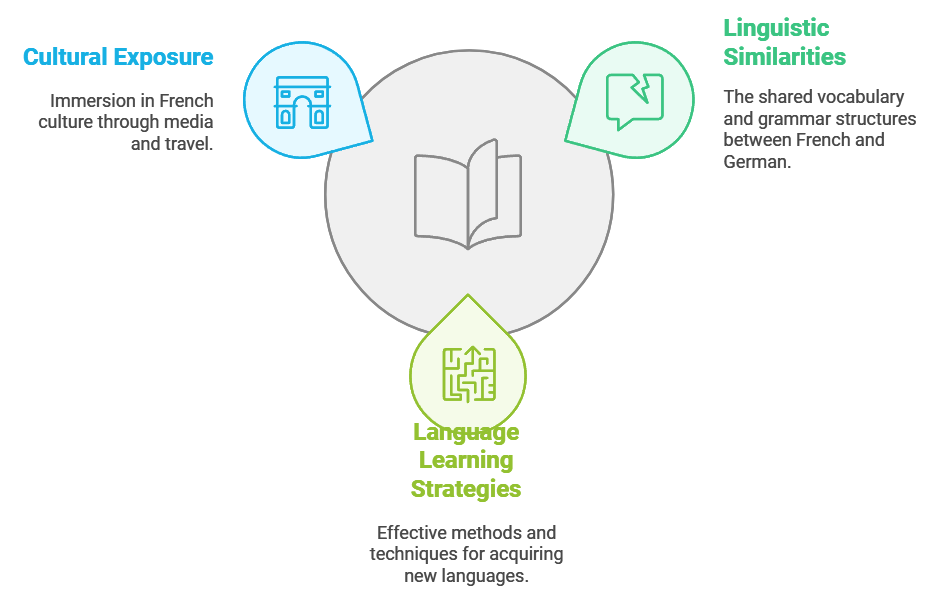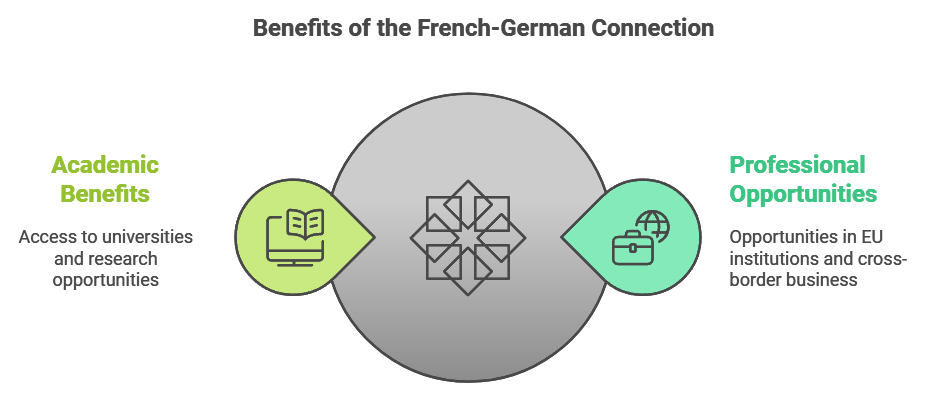Learning French as a German Speaker: How Easy Is It?
For German speakers, learning French is relatively straightforward, with an estimated timeline of 24-30 weeks to reach basic fluency. The shared Indo-European roots, similar grammatical concepts, and overlapping vocabulary make French an accessible language choice for German speakers.
Key Takeaways
- German speakers can reach basic French fluency in 24-30 weeks
- Similar gender systems and verb conjugations give German speakers an advantage
- About 40% of French vocabulary shares roots with German words
- Prior language learning experience speeds up French acquisition
- Pronunciation differences present the biggest challenge
Historical Language Connection
While French and German belong to different language families, they share deep historical connections. French, as a Romance language, and German, as a Germanic language, both evolved from Indo-European roots. During the Middle Ages, French had a significant influence on German vocabulary, especially in areas like cuisine, fashion, and diplomacy.
Language Family Comparison
| Feature | French | German |
|---|---|---|
| Language Family | Romance | Germanic |
| Gender System | 2 genders | 3 genders |
| Word Order | SVO | V2/SOV |
| Cases | None | 4 cases |
| Verb Conjugation | Complex | Complex |

Advantages for German Speakers
German speakers have several built-in advantages when learning French. The familiarity with grammatical gender, complex verb conjugations, and formal language distinctions gives them a head start.
Vocabulary Benefits:
- Approximately 40% of French words share roots with German
- Both languages use many Latin-based academic terms
- Similar international word adaptations
Prior Language Experience:
- Understanding of language learning processes
- Familiarity with grammar concept acquisition
- Strong pattern recognition skills
Common Challenges
The main hurdles for German speakers learning French center around pronunciation and specific grammar differences.
Pronunciation Challenges:
- Nasal vowels (un, en, on)
- Silent letter rules
- Liaison between words
- Stress patterns
Grammar Variations
French grammar presents some unique challenges for German speakers:
- No case system (unlike German’s four cases)
- Different past tense usage
- More complex pronoun placement
- Distinct subjunctive mood applications
Learning Timeline and Expectations
Based on research data, here’s what German speakers can expect:
| Proficiency Level | Study Hours | Timeline |
|---|---|---|
| A1 (Beginner) | 80-100 | 6-8 weeks |
| A2 (Elementary) | 160-200 | 3-4 months |
| B1 (Intermediate) | 350-400 | 6-7 months |
| B2 (Upper Intermediate) | 500-600 | 9-12 months |
Practical Learning Strategies
Want to make the most of your German language background? Here are proven strategies:
Leverage Your Advantages:
- Start with cognates and similar vocabulary
- Use your understanding of formal/informal distinctions
- Apply familiar grammar learning techniques
Study Resources:
- Comparative grammar books designed for German speakers
- Language exchange with French-German bilinguals
- Border region immersion programs
Real-World Applications
The French-German connection offers numerous practical benefits:
Professional Opportunities:
- Enhanced job prospects in EU institutions
- Cross-border business advantages
- Cultural mediation roles
Academic Benefits:
- Access to French universities
- Research opportunities
- Double degree programs

Success Stories and Statistics
Recent studies show encouraging results for German speakers learning French:
- 85% reach B1 level within 6 months
- 70% report easier grammar acquisition compared to English speakers
- 90% achieve proper pronunciation with focused practice
Practical Tips for Success
Ready to start your French learning journey? Here’s what works best:
- Begin with similar words and structures
- Focus on pronunciation from day one
- Use your German grammar knowledge as a foundation
- Practice with French-German bilingual content
- Join language exchange programs in border regions
Moving Forward
Learning French as a German speaker offers a unique advantage due to shared linguistic features and cultural connections. While challenges exist, particularly in pronunciation, the path to fluency is well-mapped and achievable. With dedicated practice and the right approach, you can leverage your German language background to master French effectively.
Remember: Your German language skills are a valuable asset in learning French. Focus on the similarities, be patient with the differences, and maintain consistent practice. Before you know it, you’ll be expressing yourself confidently in both languages.
Have you considered how your German skills might help you learn other Romance languages too? The journey of language learning never really ends – it just opens more doors to new opportunities and connections.
